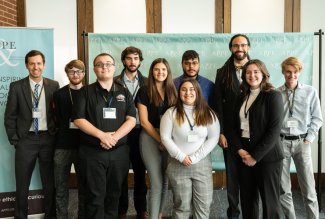
Should a high school basketball team rein in its scoring against a weaker opponent? Should artists’ copyrighted creations be fair game for tattoos? Is separating students by abilities a modern form of segregation?
College students at Ohio Northern University will wrestle with these and other thorny issues as they prepare for the APPE Intercollegiate Ethics Bowl (APPE IEB)® national championship, which will be held March 4-5 in Portland, Oregon.
They will be one of 36 teams competing against their peers using a set of cases that are drawn from real-life ethical challenges in education, business, life, and politics. Teams participating in the APPE IEB® will be judged not by their answers to such questions, but by their ability to identify and analyze the ethical dimensions of each case in a clear, focused, and thoughtful manner and to do so with an appreciation for varied perspectives.
This is the first time Ohio Northern University has qualified for the national competition. The team is coached by Dr. Jonathan Spelman and Christopher Caldwell. Team members include Cauley “Hart” Chamberlain, Alexa Clampitt, Taylor Hannam-Zatz, Noah Liechty, Gabriel Mott, and Trinity Wobler.
In addition to the topics mentioned above, cases to be used during the national competition include ethical issues such as:
- Should we prioritize wild panda conservation even though it costs billions of dollars each year?
- Is there something morally problematic about the XFL, a new professional football league, insofar as it encourages violent play to capture bigger audiences?
- Are universities justified in restricting student protests to free speech zones that are put in remote parts of campus?
During a recent practice, the team considered the question “Are laws that encourage citizens to report illegal behavior (like Texas’ abortion law and California’s gun law) morally justified?” Concepts such as virtue, societal good, motivation, the overburdened judicial system, and evolving cultural norms were discussed.
“It’s interesting how one case can change your entire viewpoint,” says Wobler. Some of the competition questions are hypothetical “but a lot are rooted in real-life issues,” she adds.
According to Spelman, “these Ethics Bowl cases are supposed to be complex and difficult to resolve. As a result, they can be polarizing. But through these conversations, we start to see the value of engaging with people who disagree with us, and we see that it’s possible to come up with collaborative solutions to our ethical, political and social problems.”
Wobler and Chamberlain say they think their team has been so successful in part because of the camaraderie and respect. “We’re all open to talking about everything and we trust each other,” says Chamberlain. “We’re all here because we want to be,” says Wobler. Both claim their balanced approaches to ambiguous situations have and will help them personally and for their future professions.
“In some ways this is teaching students how to disagree constructively, to disagree in a way that’s helpful,” says Spelman. “It’s improving them as thinkers.”
The national competition is held in conjunction with the annual international conference of the Association for Practical and Professional Ethics (APPE). APPE is an international non-profit membership organization founded in 1991 dedicated to advancing scholarship, education, and practice in practical and professional ethics.
About the Association for Practical and Professional Ethics
The Association for Practical and Professional Ethics (APPE) is an international nonprofit membership organization that supports research, training, and education in practical and professional ethics. It was founded in 1991 to encourage interdisciplinary scholarship and teaching among educators and practitioners. APPE hosts an annual conference and the APPE Intercollegiate Ethics Bowl® each February. Since 2017 APPE has been housed at the Prindle Institute for Ethics at DePauw University in Greencastle, Indiana. Learn more at www.appe-ethics.org.